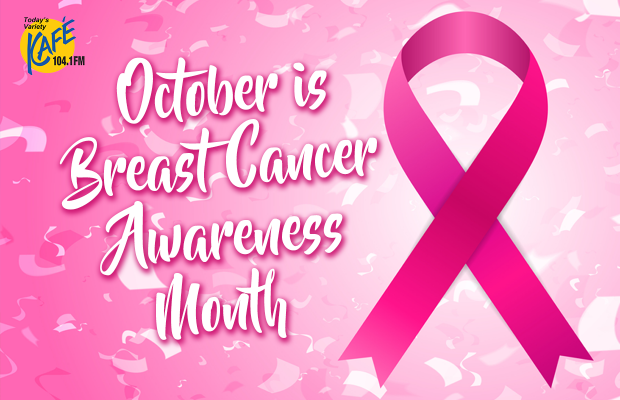KAFE cares about our community…AND YOU! October is National Breast Cancer Awareness Month! Early detection is SO IMPORTANT when it comes to breast cancer. From early detection to lowering your risks, get important facts and details to keep yourself healthy.
Powered by Skagit Regional Health & Women’s Imaging Center and the Bellingham Breast Center!
Charlie Maxx’s Breast Cancer Awareness Challenge
“This month, I run at least a mile everyday to bring awareness that there is still no cure. So, if you want to follow along, or have someone you’d like me to run for, follow my journey on Instagram – @chazmaxx.” ~Charlie
 Check out this year’s Breast Cancer Awareness patrol car from the Bellingham Police Department! Made even better by a partnership with DVSAS this year, too!
Check out this year’s Breast Cancer Awareness patrol car from the Bellingham Police Department! Made even better by a partnership with DVSAS this year, too!
(Photo courtesy of the PeaceHealth Community Cancer Center)
Startling Statistics
- About 1 in 8 U.S. women (about 13%) will develop invasive breast cancer over the course of her lifetime. 1 in 39 women (about 3%) will die from breast cancer.
- In 2022, an estimated 287,850 new cases of invasive breast cancer are expected to be diagnosed in women in the U.S., along with 51,400 new cases of non-invasive (in situ) breast cancer. Death rates from breast cancer have been steady in women under 50 since 2007 but have continued to drop in women over 50. The overall death rate from breast cancer decreased by 1% per year from 2013 to 2018. These decreases are thought to be the result of treatment advances and earlier detection through screening.
- As of January 2022, there are more than 3.8 million women with a history of breast cancer in the U.S. This includes women currently being treated and women who have finished treatment.
- Breast cancer is the most commonly diagnosed cancer among American women. In 2022, it’s estimated that about 30% of newly diagnosed cancers in women will be breast cancers.
- Breast cancer became the most common cancer globally as of 2021, accounting for 12% of all new annual cancer cases worldwide, according to the World Health Organization.
- A woman’s risk of breast cancer nearly doubles if she has a first-degree relative (mother, sister, daughter) who has been diagnosed with breast cancer. Less than 15% of women who get breast cancer have a family member diagnosed with it.
- About 85% of breast cancers occur in women who have no family history of breast cancer. These occur due to genetic mutations that happen as a result of the aging process and life in general, rather than inherited mutations.
- The most significant risk factors for breast cancer are sex (being a woman) and age (growing older).
- In Whatcom County in 2022, 291 women received a diagnosis of breast cancer. Most of the women diagnosed were between the ages of 60-80. The youngest was 29 years old and the oldest was 98 years old. MOST of these were caught in stages 0 & 1 (the earliest stages). That tells us that early detection is working!
Breast Cancer Information
•From genetics, to age, here are tips on lowering breast cancer risks!
•What you can do to detect breast cancer early.
•Tips on how breast cancer is treated.
•How do I tell my family I have breast cancer? Tips for telling your friends and family.
•Find the “can” in breast cancer survivor stories! Here, and here.
•From what it is, to what to wear and where to go! Tips for getting your mammogram!
•Does insurance cover a mammogram? Find out.
•The ACS definitive guide to research, treatment and inspirational breast cancer survivor stories!
KAFE’s Breast Cancer Awareness Month information is made possible by:


Skagit Regional Health & Women’s Imaging Center
Skagit Regional Health and the Women’s Imaging Center are proud to sponsor October’s Breast Cancer Awareness month!
Now offering 3D mammography screenings in two convenient locations, in Mount Vernon and Arlington. Schedule your screening mammogram today. Visit SkagitRegionalHealth.org/Mammograms or call 360-814-8208.
Because detecting breast cancer early means you can be there to share your family’s traditions.

Bellingham Breast Center is proud to be the first accredited breast center in Washington State.







